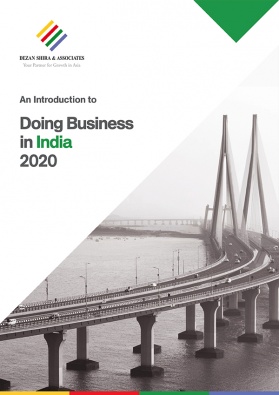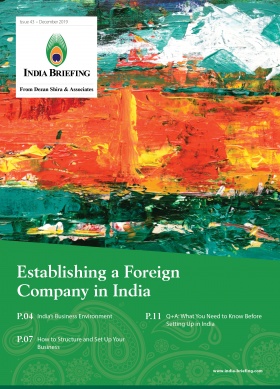Industrial Licensing in India: Norms and Policy
Since the liberalization and deregulation of the Indian economy in 1991, most industries have been exempt from obtaining an industrial license to start manufacturing in India. Government attention is reserved only for those industries that may impact public health, safety, and national security.
In India, industrial licenses are regulated by the IDRA, 1951 Act, and are approved by the Secretarial of Industrial Assistance (SIA) on the recommendation of the licensing committee.
The provisions of the Act restrict a licensed industrial undertaking from manufacturing a new article unless the license has been renewed or a new license has been obtained to include the new article.
Industries that require industrial licensing for manufacturing in India include:
- Industries under compulsory licensing; and,
- Industrial undertakings attracting location restrictions. The licensing provision also applies to the expansion of the existing industrial units.
Removal of manufacturing curbs on products previously reserved for MSMEs
Earlier, large industries that manufactured items that were exclusively reserved for Micro, Small, and Medium Enterprises (MSME) also needed to obtain an industrial license.
MSMEs were previously known as Small Scale Industry (SSI). The provision was aimed at protecting indigenous manufacturers from unequal competition with large scale industries.
However, in April 2015, the government unreserved these items to encourage greater foreign investment, incorporate better technologies, and enhance competition in the Indian and global market for the products.
Large industries are now permitted to manufacture items, including bread, pickles and chutneys, mustard oil, groundnut oil, wooden furniture, firework, steel chairs and tables, padlocks, stainless steel and aluminum utensils, glass bangles, exercise books and registers, wax candles, laundry soap, safety matches, agarbattis, etc. without obtaining an industrial license.
Industries subject to compulsory licensing in India
Businesses planning to establish industries to produce any of the following items in India must obtain a compulsory license:
- Tobacco items
- Defense aerospace and warships
- Hazardous chemicals
- Industrial explosives
These industries require compulsory licensing because of environmental, safety, and strategic considerations.
The Industries (Development and Regulation) Amendment Act, 2016 excluded the production of alcohol for potable purposes (domestic consumption) from the ambit of the Act. (The Supreme Court in a 1997 judgment demarcated the regulation of production of alcohol between the central government and the states. Thus, the central government regulates the production of alcohol for industrial use and states regulate the production of alcohol for domestic consumption.)
According to the Department for Promotion of Industry and Internal Trade (DPIIT), given that the government of India does not issue licenses in any other case, Press Note 17 (1984 series) had become irrelevant and thus withdrawn.
See here for Press Note No.3 (2019 Series), which withdraws the previous notification – Press Note 17 (1984 series) – that applied to environmental clearance, conditions of letter of intent, and industrial licenses.
Further, industrial or arms license is not required for the manufacturer of any parts or accessories in the defense sector – unless they are specifically listed for procuring licenses from the DPIIT.
The department is the licensing authority for the following products – defense aircraft, warships, body armor, and specialized equipment for military training. In May 2017, the DPIIT was granted authority to process and grant licenses for the manufacturing of defense items; prior to this, the authority lay with the Ministry of Home Affairs.
Location restrictions for industries in India
Under this provision, industries located within 25 kilometers of the periphery of cities having a population of at least one million, must obtain an industrial license from the federal government.
This location restriction does not apply in the following cases:
- Industries manufacturing electronics, computer software and printing, or any other industry that may be classified as a ‘non-polluting industry’; or
- Industries located in an area designated as an ‘industrial area’ before July 25, 1991.
The location of industrial units is subject to appropriate local zoning, land use regulations, as well as environmental regulations in order to maintain ecological discipline.
License registration for industries
The DPIIT has established the Department for Promotion of Industry and Internal Trade G2B Portal – a single window portal to obtain clearance from various governments and government agencies. The portal is an integrated platform that provides access to government to business (G2B) services, such as filing of Industrial Entrepreneurs Memorandum (IEM) and Industrial License (IL) applications online. The online portal has the required authentication mechanisms for submitting IEM and IL applications.
Previously, the application for registration was made to the Secretariat of Industrial Assistance (SIA), Department of Industrial Policy & Promotion (DIPP) along with a fee.
Once the license is obtained, an industrial undertaking is eligible for the allotment of controlled commodities and for the issuance of an import license for goods required for its construction and operation.
For more information and assistance, please feel free to email us at india@dezshira.com.
Editor’s Note: The article was first published in June 2012 and has been updated on September 6, 2017 and August 18, 2020.
About Us
India Briefing is produced by Dezan Shira & Associates. The firm assists foreign investors throughout Asia from offices across the world, including in Delhi and Mumbai. Readers may write to india@dezshira.com for business support in India.
- Previous Article India Offers New Industrial Investment Opportunities in Andhra Pradesh
- Next Article Tax Scrutiny in India to Go ‘Faceless’: What Does it Mean?








